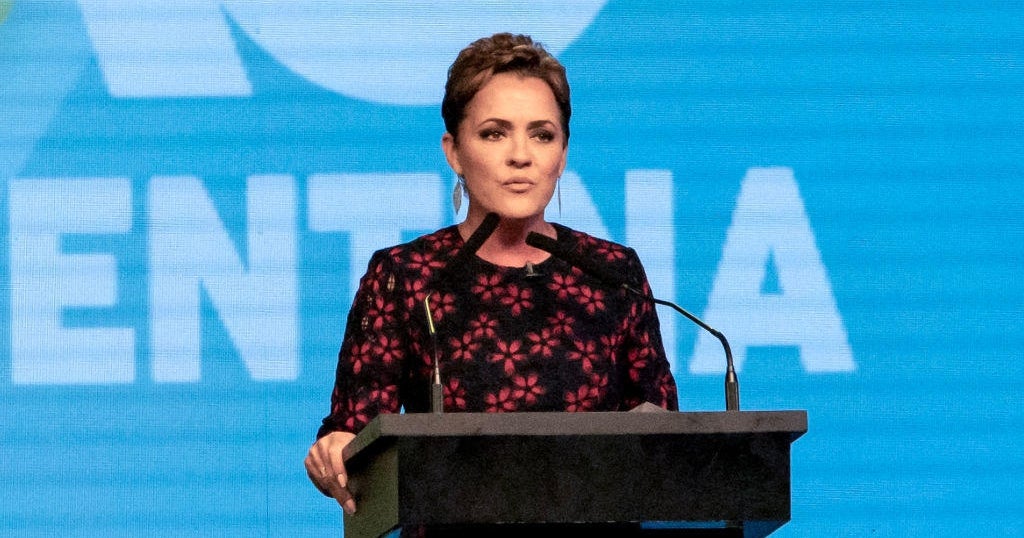Former YouTube CEO Susan Wojcicki's sisters remember her legacy: "Susan wanted to help others"
YouTube sought to honor its former CEO Susan Wojcicki by sharing a blog post that she wrote in June, two months before she died from lung cancer at 56 years old.
The blog post, shared on Monday, reads in part, "My goals going forward are to enjoy the present as much as possible and fight for better understanding and cures for this disease."
YouTube's current CEO Neal Mohan explained Wojcicki planned to publish the post this fall, and with November being Lung Cancer Awareness Month, he said the company wanted to take "this opportunity to carry on Susan's mission to help others by publishing her blog."
Wojcicki was diagnosed with lung cancer in 2022. She stepped down as YouTube's CEO in February 2023.
According to the American Cancer Society, lung cancer is the second most common cancer in men and women in the U.S. It is also the leading cause of cancer deaths in the United States.
When 40% of lung cancer cases are diagnosed, the cancer is already at stage four, meaning it's metastasized to other organs, according to the National Institutes of Health.
"We used to joke sometimes, she was CEO of YouTube then she became CEO of her cancer," Susan Wojcicki's sister, Anne Wojcicki, who is the CEO of the company 23andMe, told "CBS Mornings" in an exclusive interview.
Anne, along with sister Dr. Janet Wojcicki, a professor of pediatrics and epidemiology at the University of California, San Francisco, explained that Susan was not having trouble breathing, but instead was experiencing hip pain.
"What was confusing to her is you think you have lung cancer, shouldn't your doctor be able to listen to your lungs and hear, at least hear something small? But she heard nothing," Janet Wojcicki said. "So it was, like, Susan was just blown away by that. Like, 'Here I am. You're telling me I have terminal disease, right, and I'm sitting on your table and you can't even hear a tiny thing.'"
By the time it was discovered, Susan Wojcicki's cancer had spread throughout her body.
"I don't think we fully accepted it, to be honest with you because she looked good. She did not appear sick," Janet Wojcicki said. "So she had a high quality of life, like, up until the last couple of months and secondly I think a lotta people with a terminal diagnosis, you think, 'Oh, maybe it won't be me.'"
Initially, Susan Wojcicki was private about her diagnosis.
"In part because it was such a shock and she does have five children. So like, just being able to communicate that, you know, to her family, and also just make sense of what are her treatment options," said Janet Wojcicki.
But their sister wanted to help others through her diagnosis.
"Susan was very committed. Like, 'I want this to benefit me, but I want it to benefit the legacy of all the other people who are in this awful situation.' So that's why we're also very committed still of funding, how is it that we can fund early detection work? How is it that we can fund some of the treatment options," Anne Wojcicki said.
In the blog post released by YouTube, she wrote about how she and her husband actively supported cancer research before her diagnosis but increased their efforts after learning more about lung cancer.
"We have since given millions of dollars to support early detection research, new immunotherapy options that could cure cancer, building a community of genotyped patients to better understand the disease, and fundamental research to better understand the mechanisms and science behind the cancers," Susan Wojcicki wrote.
Susan Wojcicki was not a smoker, a common cause of lung cancer. Because of her unexpected diagnosis, her sisters want to focus on early cancer detection through Susan's legacy.
"I think that there's a moment that we can have with lung cancer. 'Cause I think that there really is an opportunity to actually have an early diagnostic so that you could screen, that you could then, you know, really save huge number of lives," Anne Wojcicki said.
In July, 23andMe and over 20 other groups launched a lung cancer genetics study to research the disease and to ultimately find a cure. Nearly 1,400 people are currently enrolled in the study. They hope to have 10,000 participants join over the next three years.
"I mean, you think about all the lives that mammography and colonoscopy ... how many lives they've saved. I mean, why are we not, as a community, as a nation, that is so technologically capable, why are we not prioritizing this? It just doesn't make sense," Janet Wojcicki said.




